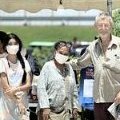Burma Gets Chinese Help to Enter UN Carbon Market
-
Recently Browsing 0 members
- No registered users viewing this page.
-
Topics
-
-
Popular Contributors
-
-
Latest posts...
-
40
-
25
UK Fears grow over migrant protests: Warnings of unrest as tensions rise in UK communities
Let's try to keep this a serious thread. You can troll elsewhere. -
40
Report British Embassy Alerts Pattaya Expats to Growing Risks
None of the people who try to smuggle numerous kilos into the UK from Thailand do it because they believe it might be legal elsewhere! I’m sorry. It’s illegal in most countries and if you live in of the countries where it is legal, you know about that. -
33
UK UK Rents Jump £221/Month Since 2021: Tenants Feel the Squeeze
Interest rates are at absurdly low levels for more than a decade. If they were maintained at 8 to 10% per annum and left there, then you would have a normal housing market. -
59
Report Welshman Heads Home After Medical Emergency in Thailand
I find it very irritating that people don't take responsibilities for their lives and expect others to clean up their mess after them. Simple as that. -
48
UK Flat – Sell or Keep Renting? Expats Who’ve Been There – What Did You Do?
Not as long here as you but I'm currently doing this (UK based). I thought about renting it out but advice from mates who are landlords in the UK said don't do it as it's such a pain. I justify it to myself by saying that what it costs me to keep it empty would be outweighed by hotel/hire car/eating out costs for the time I spend at home (usually a month at a time twice a year).
-
-
Popular in The Pub









Recommended Posts
Create an account or sign in to comment
You need to be a member in order to leave a comment
Create an account
Sign up for a new account in our community. It's easy!
Register a new accountSign in
Already have an account? Sign in here.
Sign In Now